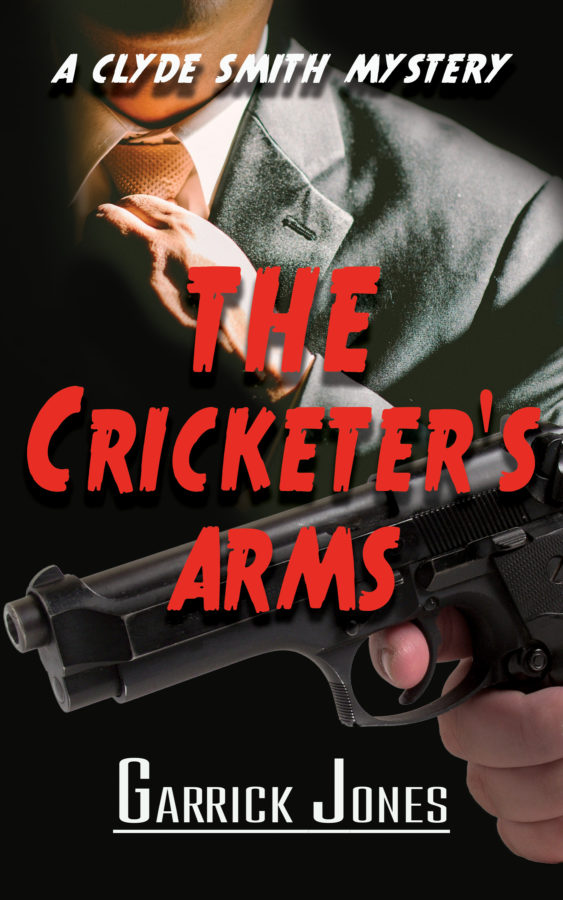by

- The Cricketer's Arms
- The Gilded Madonna
- The Grocers' Son
- Bridge at the Beach
“I’m sorry I have to tell you this, Harry, but Daley Morrison was murdered. It was no heart attack. He was stabbed through the heart and then staked out, naked, in the middle of the Sydney Cricket Ground as some sort of warning to someone.”
Harry Jones almost fell into his chair, such was his shock.
Clyde Smith is brought into the investigation by his former colleague, Sam Telford, after a note is found in the evidence bags with Clyde’s initials on it. Someone wants ex-Detective Sergeant Smith to investigate the crime from outside the police force. It can only mean one thing—corruption at the highest levels.
The Cricketer’s Arms is an old-fashioned, pulp fiction detective novel, set in beachside Sydney in 1956. It follows the intricacies of a complex murder case, involving a tight-knit group of queer men, sports match-fixing, and a criminal drug cartel.
Was Daley Morrison killed because of his sexual proclivities, or was his death a signal to others to tread carefully? Has Clyde Smith been fingered as the man for the case, or will the case be the end of the road for the war veteran detective?
Publisher: Moshpit Publications
Editors:
Cover Artists:
Genres:
Pairings: M-M
Heat Level: 2
Romantic Content: 1
Ending: Click here to reveal
Character Identities: Gay
Protagonist 1 Age: 36-45
Protagonist 2 Age: 36-45
Tropes: Fated Mates / Soul Mates
Word Count: 135000
Setting: Sydney, Australia 1956
Languages Available: English
Series Type: Continuous / Same Characters
The last time I'd seen him was three months ago, on my last day in the force. I'd gone straight into the police, a month or two after being demobbed. Nine years, only two of which I'd pounded the pavement. After that, a year as a D.C., and then swiftly pushed up the chain to detective sergeant. But, in no time at all, I'd become sick of the bullshit—the rules and regulations, the old-boys clubs, the brown-paper envelopes, and the rest of the horror of bent cops in the 1950s—guys who'd stayed at home during the war and become pally with the sly-groggers, S.P. bookies, and petty-crims. All I'd wanted to do was to get a job done, but there was too much else getting in the way to make it satisfying enough for me—and to be brutally honest, I couldn't be fucked playing the game.
READ MOREThe final straw had been a missing evidence bag on the day of an indictment at Darlinghurst Court. The case had fallen apart, the judge had given me a bollocking, and I'd been humiliated. That's what led me to toss in my badge and try my hand at journalism. I'd enough put by to keep my head above water for a few years, so I'd rented a nice upstairs flat by the beach with good views over the ocean, and had started to submit copy-pieces to the local rags. It had gone well, even though I wrote articles on things I couldn't give a shit about. I had a talent for stringing words together so the local fete sounded like the Rio de Janeiro Mardi Gras had come to town.
"How's Jeanette?" I asked. "Living together yet?"
I knew I was being provocative. His "girlfriend" was a strict Catholic girl who was keeping it for marriage. She was a front, and we both knew it.
His face changed. "You don't let things go, do you."
I shook my head. "Nope."
"I'm sorry if you don't like it, but some of us care what the rest of the world thinks."
"You think it's going to go away, don't you, Sam? You think one morning you're going to wake up and be 'normal'—whatever that is. Cups and milk … behind you."
I could see I'd made him angry. But I was angrier with myself than with him. Even when he turned to take the crockery from the shelf and the milk from the fridge, I couldn't help staring at the outline of his arse in his slacks, and checking out whether he still wore baggy-legged boxers, or the new "slips", as they called them, that were starting to become the rage. I couldn't tell if the bump in his profile was the result of tight briefs or whether our little toe-to-toe in the hallway had made him fatten up a bit in his underpants.
The machine began to bubble, so I took the coffee pot from the stove and poured two cups. Sam was leaning on the kitchen sideboard and had taken his smokes from his shirt pocket.
"Matches?" he asked.
"Where's your lighter?"
"In my pants pocket. Wanna get it out for me?"
"Master of the single innuendo," I said. "Nothing's changed."
No more than three months ago, he'd have already had his hands in my trousers. Everything had changed on my last day at work, when he'd refused to come and have a drink with me at the pub—Jeanette was waiting for him to take her to the pictures. I'd told him to go fuck himself. It had been the ultimate denial of our friendship. He'd tried to explain later on, but I'd hung up the phone in his ear. Since then, there'd been nothing, although I'd seen him once or twice out and about, but had always turned my back on him and gotten away as fast as I could.
"You know I'm sorry, Clyde."
"I don't care anymore, Sam."
"Liar," he said.
I was about to start an argument—I could feel it building up in me from the soles of my shoes, but then he gave me the old "Sam smirk" and I felt myself go cold.
"You said you came on business?" I said instead.
"Oh, yeah. Here." He reached into his jacket pocket, which he'd hung over the back of a kitchen chair, and handed me a small square of folded paper.
"What's this?"
"It's for you, is my best guess."
I unfolded it, aware that he'd started a not-so-subtle game of pocket billiards while he watched my mouth, slowly chewing his bottom lip. On the note were two letters, separated by full stops.
C.S.
"My initials?"
"Yeah."
"Where'd you find this?"
"On a corpse," he said.
COLLAPSEI only learned of this series when the latest volume, “The Grocer’s Son” appeared—so I bought all three and started right in. This first book is brilliant, and sets the reader up with both a satisfying ending and vast possibilities as to what might happen.
Garrick Jones writes with such an authentic voice, that it forced me to keep reminding myself that this wasn’t actual 1950s detective fiction. Like Frank Butterfield’s epic Nick Williams series, the Clyde Smith mysteries take us back two generations, to a world where being gay was still criminal, and the immediacy of World War II had not faded from anyone’s mind.
An army officer-turned-policeman, Clyde Smith has left the Sydney police because of his discomfort at the depth of the corruption in the ranks. He’s trying his hand at journalism, with a sideline in private investigation—both talents he developed as a soldier.
The story opens with Sam Telford, Clyde’s former police partner and ex-boyfriend, pounding on his door, bringing him news of a grisly murder—and a note addressed to Clyde apparently found at the scene. Thus the author plunges right in, opening up what becomes a dark, messy mystery involving sports betting and drugs, and also pulling the reader into a close look at the gay demimonde in Australia in the 1950s.
What is so engaging about the book, aside from Jones’s splendid writing, is this parallel track, in which Clyde’s life as a gay man and his skill as a detective are given equal prominence, both aspects of his personality driving the story and the character’s development. Love, sex and friendship are treated with frankness and emotional acuity. Neither the idea of “friends with benefits” or open relationships were invented by my generation; any more than police corruption or organized crime were. It is Clyde Smith’s integrity, and his emotionally honest approach to his own world, that gives the narrative its strong moral compass.
This is an era when subterfuge was the rule in order for men to maintain any sort of relationship. Sometimes that subterfuge included wives and fiancées used as a smokescreen. It’s a reality that has not, in fact disappeared even in 2022, but which was much more routine and accepted a lifetime ago. Indeed, my generation still feels deeply unhappy at the idea of all those women who became pawns in their boyfriends’ and husbands’ machinations. Clyde Smith (exactly my parents’ age) feels the discomfort deeply, but tries not to judge—until it encroaches on his own happiness.
Garrick Jones offers twists and turns right to the last pages, and gives equal weight to both the mystery and the love story. The book left me wanting more of Clyde Smith, and ready for the next one.
Also available as eBook from all online retailers.






